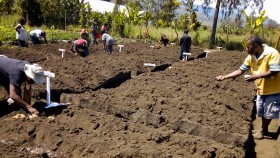We Need to Talk About The Rapid Decline in Insects Around The World
Apocalypse or revolution? Depending on the study making headlines, insect numbers around the world are either in dramatic freefall or simply an alarming state of flux, with some species even benefiting from changes in climate.
While researchers debate the details, most are in agreement that our existing lifestyle is fundamentally linked with insect numbers, and unless we act fast, we can expect trouble in the future.
In a series of papers published in the latest Proceedings of the National Academy of Sciences (PNAS), experts sum up the state of insect numbers as a measure of biomass, individual numbers, and species. And no matter which way we cut it, it's an issue we really need to get on top of.
Saul Cunningham from the Australian National University wasn't one of the 56 authors contributing to the commentary. But as Director of the Fenner School of Environment & Society at the university, he's aware of just how important insects are to our communal wellbeing.
"Insects are hugely important to ecological processes that humans rely on, including the provision of food and recycling of nutrients into the soil," says Cunnigham.
"That is why they have been described as the little things that run the world."
Read the full article on the Science Alert website, featuring Prof Saul Cunningham











